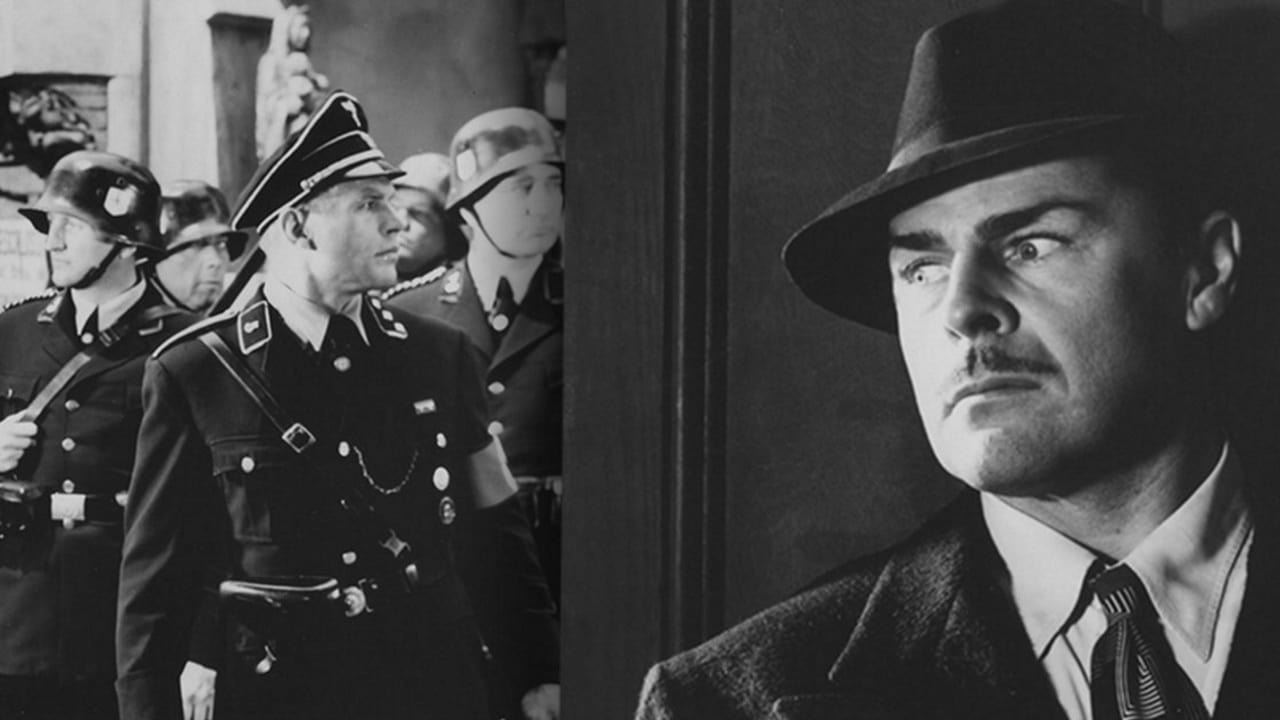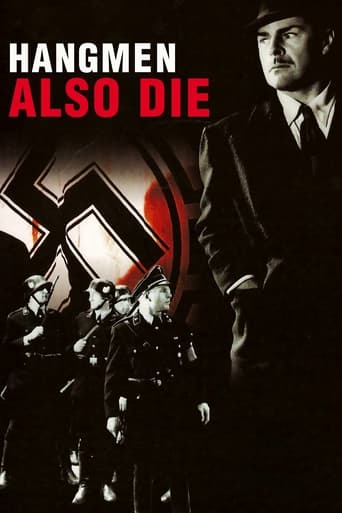

Inspired by the actual assassination of a Gestapo official in occupied Czechoslovakia, this World War II thriller from Fritz Lang follows the Nazis as they go to brutal measures to coerce the Czech assassin and those sheltering him to give him up. Clocking in at over two hours, the film feels on the long side with some subplots (such as a jealous fiancé) that could have easily been trimmed, but for the most part, it is a gripping ride thanks to several high quality performances. Brian Donlevy is never too remarkable as the assassin on the run, however, Anna Lee is excellent as the young Czech woman who shelters him and then finds herself conflicted with whether or not to turn him in after the Nazis take her father and others hostage. Under heavy makeup, Walter Brennan is also superb as Lee's philosophical father, though the most impressive turn comes from Gene Lockhart as a cunning Czech traitor with some highly memorable exasperation scenes towards the end. Not all the actors are that good; Alexander Granach overplays his part as the chief of the Gestapo and the rest of the Nazis in the film are pretty interchangeable. The wide range of American accents heard throughout also makes the Czech setting occasionally hard to buy. That said, the story comes with a welcome universality with Donlevy's internal dilemmas certainly resonating, torn between giving himself up so that his fellow countrymen will not suffer and staying in for the long haul, knowing how instrumental he can be in helping to thwart his country's oppressors.
... View MoreIf you're going to enjoy this, you'd better clear your mind of any knowledge you might hold of the assassination of Heydrich in occupied Czechoslovakia. Treat this as a fictional tale about a fictional hunt for a fictional assassin in Prague.The historical facts are too depressing anyway. Heydrich was murdered by two guys. The Nazis tortured Czechs until one of them squealed. Then they tracked the assassins to a church and the two killers committed suicide. The Nazis then destroyed a village that had nothing to do with political events. See "Operation: Daybreak."Here, we have Brian Donlevy as a doctor in Prague who shoots Heydrich. He then has to seek immediate shelter in the house of strangers, in this case, the home of Professor Walter Brennan and his family, including daughter Anna Lee.The Gestapo are understandably upset and they organize a manhunt for the killer, which centers around Donlevy and around the family that sheltered him. The Nazis round up and execute Czechs at random but nobody talks. And, in the end, the underground frames a Nazi agent for the crime.The Nazis aren't shown as stupid brutes. Alexander Granach, the Gestapo Inspector, is positively clever in a swinish, almost comic way. Fritz Lang has him with a haircut that the punk rockers of the 80s would have envied. His military mustache curls up at the ends, as in a morale-boosting poster left over from World War I and his plump neck hangs over his collar. His gestures are operatic, his perceptions acute, his consumption of beer heroic.Not far behind, if in fact he's behind at all, is Reinhold Schünzel as the uniformed Gestapo officer. He smiles pleasantly, leaning back and tripling his chin, while describing the torture that a suspect is about to undergo, but in an avuncular way, as if about to buy a child an ice cream cone. While the victim stands shivering, Schünzel grins, swivels in his office chair, and cracks his knuckles one by one.Less of an actor but more of a straight figure is Tonio Selwart as the Chief of the Gestapo. Less of a caricature, more of a character. He doesn't smile or squint. He speaks quietly and with sweet reason. And he wears those great uniforms with riding breeches and boots, and he wears a monocle, and Fritz Lang shows us Selwart peering into a mirror and squeezing a zit on his cheek.The good guys are much less interesting. Brian Donlevy is referred to as a young man but he's a little old for that. I mean, the guy was in Mexico with General Pershing in pursuit of Panch Villa, wasn't he? And anyway, he's practically ligneous. If his expression ever changed, I missed it, and he walks with his chest thrown out like a pigeon's. Dennis O'Keefe, in a minor part, is harmless as always. Walter Brennan, toothless old Walter Brennan, comic sidekick, does rather well by the role of a professor of history, and Anna Lee as his daughter is cute as hell. Slender, wide-eyed, shivering with fright. I love her. The problem is that all the good guys stand around spraying patriotic clichés just as a lawn sprinkler sprays water.No, it's not Fritz Lang's best picture but neither is it is worst. The script credit goes to Berthold Brecht but I understand he didn't contribute much. Still, I'm glad he was in Hollywood instead of (gulp) elsewhere. His songs for the comedy "Where Do We Go From Here?" are memorable. Lang was a popular director in Germany and was asked by Goebbels to head the movie propaganda program of the Third Reich. As he describes it, he replied, "I'm tickled pink," and was on the next airplane out of Berlin. He brings some of his expressionism and originality with him. The dark, deep, dramatic shadows of films like "Ministry of Fear" are already adumbrated, so to speak.And he does something that should earn him a medal. Lang was fond of using mirrors in his films for some reason. (Check out "Woman in the Window.") Here, he has Granach run to a mirror to inspect some smeared lipstick on his cheeks. And -- guess what -- Granach looks AT HIS OWN REFLECTION and not at the camera lens. When the actor looks at the audience instead of himself, it's a jarring estrangement for the viewer, who is hit over the head with the realization that this is not just a movie, but a clumsily directed one, an insulting one, at that.You know, considering that so many of the cast were born in Germany, you have to wonder just how often directions were given in English. Lang was quite an authoritarian. I can see him now, strutting about with his boots, riding breeches, and monocle, bellowing orders through a bullhorn.
... View MoreVery good anti-Nazi propaganda from Fritz Lang. The story concerns the real-life assassination of Reinhard Heydrich, the commander in charge of the Czechoslovakian occupation. The Nazis round up a bunch of adult men in Prague and threaten to execute a number of them every day until the assassin turns himself in or is turned in. Brian Donlevy plays that assassin, a doctor working with the Czech underground. He is helped after the assassination by Anna Lee. Like all good Czech citizens, she wants to protect Donlevy, but when her own father (Walter Brennan) is taken hostage by the Nazis, she is torn. Anna Lee is one of my favorite underrated actresses from the classic era (my favorite of her performances is in the Val Lewton picture Bedlam), and she's wonderful here. Most of the rest of the cast is quite good, as well, especially Gene Lockhart as a Czech who is collaborating with the Nazis. The one big exception in the cast is Alexander Granach, who plays the chief of the Gestapo. He overacts quite a bit. The direction and story (co-written by Bertolt Brecht) are quite good, though I think it starts to get sloppy near the end. It definitely goes on a tad too long. But I very much liked it as a whole.
... View MoreWhen I was a kid I watched a documentary program with my father about Reinhardt Heydrich. I can't remember the name of the show now, but it was one of the top series of the time, each week taking an event from history and examining it in depth. The horror of Heydrich's brutality has remained with me for close to fifty years now, and I've never forgotten his name, even though when I first watched that show I had never heard of him.Which is why it would have been more compelling to tell the true story in "Hangmen Also Die". But if you go in without knowing the historical account, the film serves well as a fictional work that still manages to portray the Nazis as a brutal regime bent on crushing any and all resistance. The tenacity of the Czech underground is also conveyed via the solidarity of it's members to remain true to the ideals of freedom and liberty. Particularly moving was the speech Professor Novotny (Walter Brennan) asked his daughter Nasha (Anna Lee) to memorize to pass on to her younger brother.The story keeps one's interest with some rather amazing twists and turns, chief among them Nasha's initial attempt to tell what she knows (or thinks she knows) at Gestapo headquarters. Once Nasha realizes that a larger issue is at stake than the fate of her own family, she becomes a willing fighter for the cause. The second half of the story takes on a Mission Impossible type of subterfuge designed to pin the assassination of Heydrich on an unwitting traitor and Gestapo informer (Gene Lockhart as Emil Czaka). It's not revealed how the underground managed to put the plan together, but all the right witnesses came forward as necessary to implicate Czaka as he slowly unravels.I think it's important to keep the memory of brutal regimes like Hitler's Nazis alive as a warning to future generations. Here it's presented on a number of levels with the random executions of hundreds of innocent victims to the entirely thuggish individual beating of the old florist lady. Even in the face of such overwhelming persecution, it's encouraging to be reminded that those who believe in freedom and liberty will always find a way to triumph.
... View More